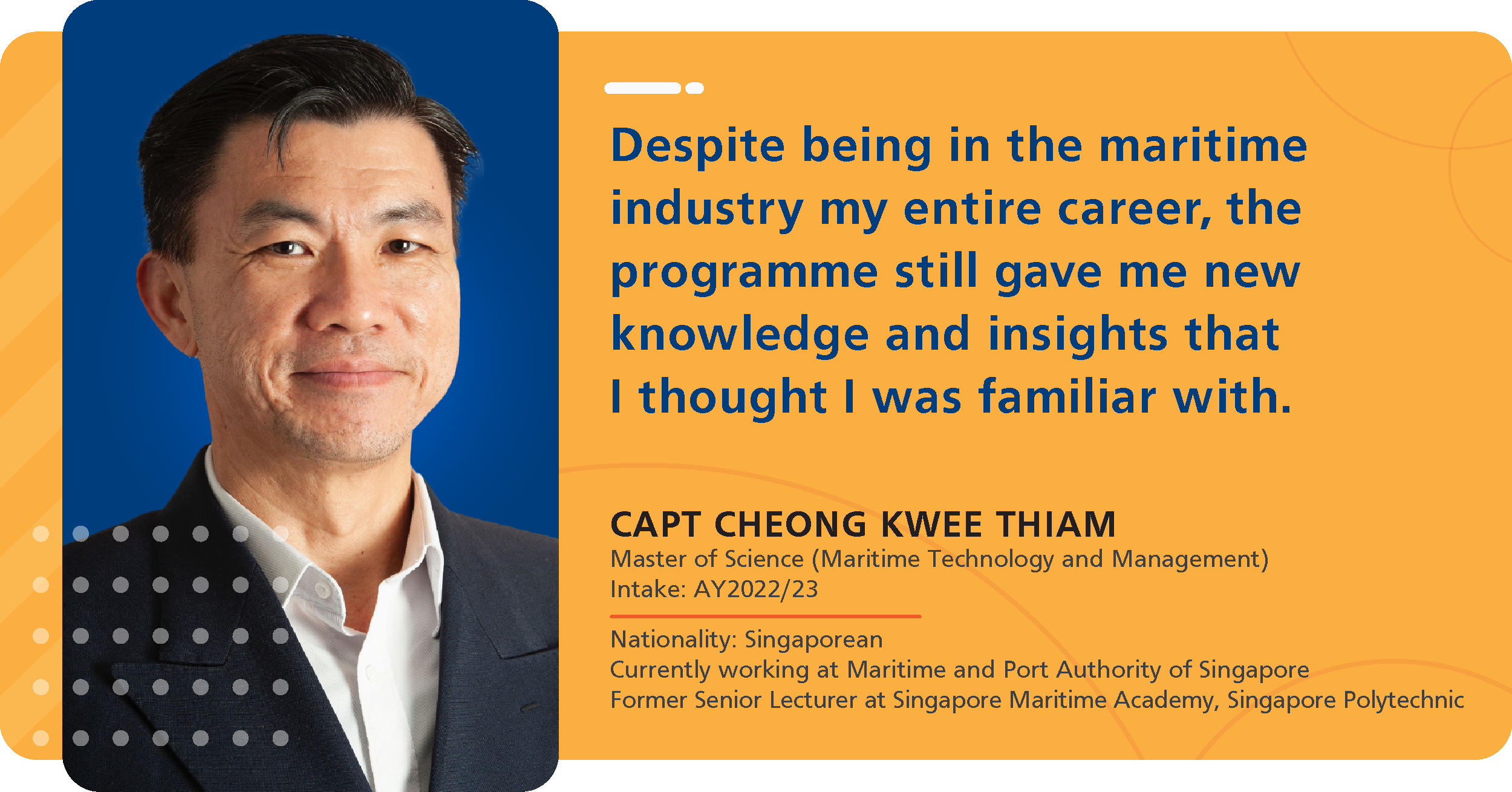In Singapore, where bustling ports serve as the lifeblood of our maritime industry, Captain Cheong Kwee Thiam has spent several decades navigating the ever-changing waters of shipping. He has sailed the seas as a Master Mariner, managed fleets as a Marine Manager, shared his expertise as a lecturer, and now conducts critical investigations as a Principal Marine Investigator.
His career has been marked by a profound passion for the maritime world and an insatiable curiosity to understand the dynamics of the industry, as he constantly seeks to uncover the forces driving its advancements.
Navigating the Seas of Change
Captain Cheong started our conversation by sharing an interesting observation between the sizes of ships and their crews. “It is clear that over the past three decades, ships, especially container vessels, and waterways like canals, have been steadily increasing in size. However, although the ships are getting bigger, the number of crew members needed to operate them has remained the same,“ he revealed.
This runs contrary to expectations but is possible because modern ships are equipped with highly advanced tools, instruments and machinery. These significantly reduce the effort required to operate them manually, leading to ship operate more efficient with less crew. The crew are also expected to continuously upgrade their skills and knowledge to meet new and future technologies advancements.
As a lifelong learner with a curious mind, Captain Cheong‘s fascination with advances like these — alongside other rapidly evolving aspects of the maritime industry, including regulations, environmental sustainability and digitalisation — sparked his decision to further his education. He recognised that the maritime world was growing in both size and complexity, and that getting an in-depth understanding of these hot topics would be essential for continued success in the industry.
With this in mind, Captain Cheong decided to enrol in the Master of Science (Maritime Technology and Management) (MSc (MTM)) programme at the National University of Singapore (NUS).
Always Learning, Always Improving
Captain Cheong‘s passion for the maritime industry is palpable, and it was this enthusiasm that led him to the MSc (MTM) programme. His earlier studies in logistics and supply chain management at the Singapore University of Social Sciences (SUSS) had laid a solid foundation. The Master‘s degree programme offered something more — a deep dive into the maritime sector‘s future.
“I found the MSc (MTM) programme an ideal complement to my existing education and experience. Since embarking on the programme, I have gained more confidence in discussing the pros and cons of digitalisation in the maritime industry, among other topics.“
The Learning Journey at NUS
As Captain Cheong embarked on his two-year journey through the programme as a part-time candidate, he found himself immersed in a wide array of modules that covered everything from Applied Programming for Industrial Systems to Maritime Data Analytics, and more.
Each module, he said, was a piece of the puzzle that helped him better understand the bigger picture of where the maritime industry is headed. When asked about his favourite modules, Captain Cheong replied candidly: “I enjoyed them all, and for various reasons. One of the biggest reasons is the professors, who were really committed to our learning.”

He added: “Also, the modules covered all the hot topics that I had been curious about prior to enrolling in the programme. Seeing these concepts unfold before me left me in awe and deepened my appreciation for everything we were taught.“
Applying Knowledge in Real—Time
For an industry veteran like Caption Cheong, the MSc (MTM) programme was about more than acquiring new knowledge, it was about being able to apply his learning in meaningful ways — and Captain Cheong has certainly wasted no time in doing so.
In his current role as Principal Marine Investigator at the Maritime and Port Authority of Singapore (MPA), Captain Cheong is responsible for leading inquiries and investigations into marine casualties and incidents under the Merchant Shipping Act. His duties also extend to policy work, such as participating in the International Maritime Organisation sub—committee. This blend of hands-on investigation and policymaking has provided the perfect platform for him to apply his newly acquired skills.
“I have already begun implementing what I have learned into my work,“ he told us. “For instance, I have been using Python to create visualisations and analytics, and I plan to incorporate machine learning into some of my data analysis and predictive tasks.“
The MSc (MTM) programme has also provided Captain Cheong with the tools to engage in critical discussions about the future of the maritime industry, particularly around the topics of digitalisation and environmental sustainability — areas where he sees significant potential for growth and change. He emphasised: “In my view, these matters will become increasingly important in the months and years ahead. So, it is better to be ready now.“
Advice for Aspiring Learners
For those considering furthering their education with a Master‘s degree programme at NUS, Captain Cheong offered thoughtful advice: “Learn with passion, not with expectation.“ He explained: “While our preconceived expectations may lead to frustration and disappointment, by focusing on your passion, you can confidently and assuredly make your learning journey a truly fulfilling one.“
Discover the NUS MSc (Maritime Technology and Management) Programme
The NUS Master of Science (Maritime Technology and Management) degree programme offers both full-time and part-time modes of study, which can be completed within 12 months and 24 months respectively. To learn more, visit our programme page.